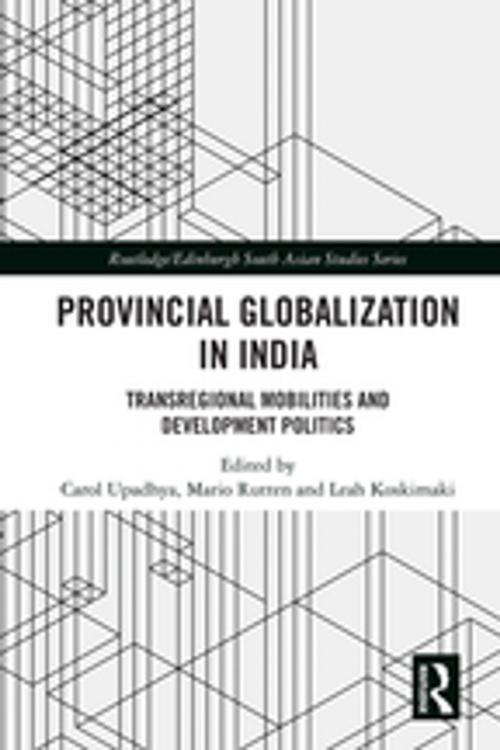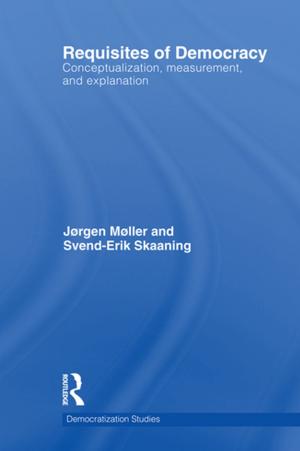Provincial Globalization in India
Transregional Mobilities and Development Politics
Nonfiction, Social & Cultural Studies, Social Science, Cultural Studies, Ethnic Studies| Author: | ISBN: | 9781351631075 | |
| Publisher: | Taylor and Francis | Publication: | June 27, 2018 |
| Imprint: | Routledge | Language: | English |
| Author: | |
| ISBN: | 9781351631075 |
| Publisher: | Taylor and Francis |
| Publication: | June 27, 2018 |
| Imprint: | Routledge |
| Language: | English |
The movement of people from small towns and villages of India to places outside the country raises a number of questions– about the networks that enable their mobility, the aspirations that motivate them, what they give back to their home regions, and how their provincial home worlds engage with and absorb the consequent transnational flows of money, ideas, influence and care.
This book analyzes the social consequences of the transmission of migrant resources to provincial places in India. Bringing together case studies from four regions, it demonstrates that these flows are very diverse, are inflected by regional histories of mobility and development, and may reinforce local power structures or instigate social change in unexpected ways. The chapters collected in this volume examine conflicts over migrant-funded education or rural development projects, how migrants from Dalit, Muslim and other marginalized groups use their new wealth to promote social progress or equality in their home regions, and why migrants invest in property in provincial India or return regularly to their ancestral homes to revitalize ritual traditions. These studies also demonstrate that diaspora philanthropy is routed largely through social networks based on caste, community or kinship ties, thereby extending them spatially, and illustrate how migrant efforts to ‘develop’ their home regions may become entangled in local politics or influence state policies.
This collection of eight original ethnographic field studies develops new theoretical insights into the diverse outcomes of international migration and the influences of regional diasporas within India. These collected studies illustrate the various ways in which migrants remain socially, economical and politically influential in their home regions. The book develops a fresh perspective on the connections between transnational migration and processes of development, revealing how provincial India has become deeply globalized. It will be of interest to academics and students in the fields of anthropology, geography, transnational and diaspora studies, and South Asian studies.
The movement of people from small towns and villages of India to places outside the country raises a number of questions– about the networks that enable their mobility, the aspirations that motivate them, what they give back to their home regions, and how their provincial home worlds engage with and absorb the consequent transnational flows of money, ideas, influence and care.
This book analyzes the social consequences of the transmission of migrant resources to provincial places in India. Bringing together case studies from four regions, it demonstrates that these flows are very diverse, are inflected by regional histories of mobility and development, and may reinforce local power structures or instigate social change in unexpected ways. The chapters collected in this volume examine conflicts over migrant-funded education or rural development projects, how migrants from Dalit, Muslim and other marginalized groups use their new wealth to promote social progress or equality in their home regions, and why migrants invest in property in provincial India or return regularly to their ancestral homes to revitalize ritual traditions. These studies also demonstrate that diaspora philanthropy is routed largely through social networks based on caste, community or kinship ties, thereby extending them spatially, and illustrate how migrant efforts to ‘develop’ their home regions may become entangled in local politics or influence state policies.
This collection of eight original ethnographic field studies develops new theoretical insights into the diverse outcomes of international migration and the influences of regional diasporas within India. These collected studies illustrate the various ways in which migrants remain socially, economical and politically influential in their home regions. The book develops a fresh perspective on the connections between transnational migration and processes of development, revealing how provincial India has become deeply globalized. It will be of interest to academics and students in the fields of anthropology, geography, transnational and diaspora studies, and South Asian studies.















